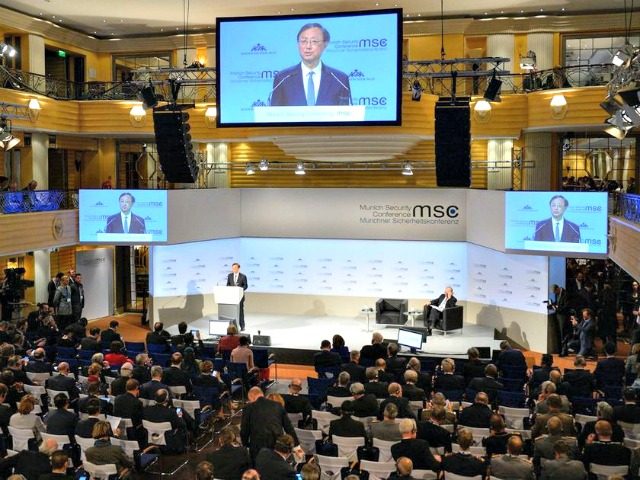MUNICH, GERMANY — There was much anticipation over the expected rivalry between the United States and China at a global security conference in Munich over the weekend, given a sense among global elites that the U.S. is withdrawing from the world, and China is growing in stature.
However, according to U.S. attendees, there was no big showdown. Rather, there was a sense of shared concern about China among top U.S. allies at the annual conference, they said.
Senate Judiciary Committee Chairman Lindsey Graham (R-SC), who led a congressional delegation to the conference, said in previous years there was a lot more focus on Russia, but that this year there was more talk about the threat from China.
“Russia is kind of like seen as a problem across the board, [but] China is becoming more of a problem across the board,” Graham told journalists from Breitbart News and the Washington Post, who traveled with him to the conference.
Graham openly slammed China during the first day of the international conference in a high-level panel with the Norwegian prime minister and the foreign ministers of France, Poland, Canada, and Japan.
“We see economic espionage by China as a real threat to our economy. We see the way they manipulate their currency, and steal intellectual property, and require American companies to have a Chinese owner that wind up stealing everything you got. We see their technology being used more for spying than technology,” he said.
Graham said it was clear to countries that “when you integrate with the Chinese economy, you’re probably integrating into a system that’s rigged against you.”
“If you’re going to hook your wagon to some group, who would you hook your wagon to? Us, right?” he added. “There’s a limit on Chinese influence.”
Graham also slammed China for recently arresting two Canadians in China, forcing other ministers to comment, albeit in a more reserved tone.
“The only thing they did was be Canadian in China,” said Canadian Foreign Minster Chrystia Freeland.
Sen. Sheldon Whitehouse (D-RI), who traveled to Munich as part of Graham’s delegation, said there was talk among allies particularly about the threat from China’s development of 5G network infrastructure worldwide.
China is ahead of the U.S. in the race to develop 5G, or fifth-generation, cellular wireless technology — which is set to determine who controls mobile communications in the future.
Beijing has poured billions into developing the technology, and has offered to build 5G networks for cheap, and countries all over the world have been signing up. However, U.S. officials and experts warn that networks built with Chinese systems are vulnerable to Chinese surveillance.
“If you buy Chinese 5G, well, you’re probably not going to be in our network,” Graham warned.
Vice President Mike Pence also openly addressed the threat from Chinese telecom companies, including Huawei, at the conference.
“We must protect our critical telecom infrastructure, and America is calling on all our security partners to be vigilant and to reject any enterprise that would compromise the integrity of our communications technology or our national security systems,” he said in a speech Saturday.
Still, China made an impression, according to some attendees.
On the second day of the conference, Chinese Foreign Minster Yang Jiechi delivered a long-winded address extolling the virtues of multilateralism and a rules-based order that Western countries have long championed.
“Unilateralism and protectionism have been on the rise,” Yang said, in a seeming rebuke to the Trump administration. “The multilateralism international order and global governance system has come under challenge. The world need multilateralism more than ever.”
“It has been China’s consistent view that the United Nations is the symbol of multilateralism,” he added. “China has all along supported multilateralism, followed the multilateral approach and advocated peace and development, and win-win [cooperation], playing its consistent role as a promoter of world peace, contributor to global development and upholder of the international order.”
In introducing Yang, German diplomat and Chairman of the Munich Security Conference Wolfgang Ischinger noted, “loyal friends who come again and again,” and recalled when he and Yang were both ambassadors to Washington decades ago.
Whitehouse said China’s platitudes rang hollow, but that it was significant they felt the need to deliver them.
“It’s a little bit like when the big oil companies are now saying that they think climate change is real,” he said. “They’re not being truthful, but it’s important that they feel the need to say it.”
“What was noted was the discrepancy between the Chinese presentation talking about multilateralism and you know, growing together, and growing together, and win-win [cooperation] versus our kind of unilateral edicts and demands. The tones were reversed from what people expect,” he said.

COMMENTS
Please let us know if you're having issues with commenting.